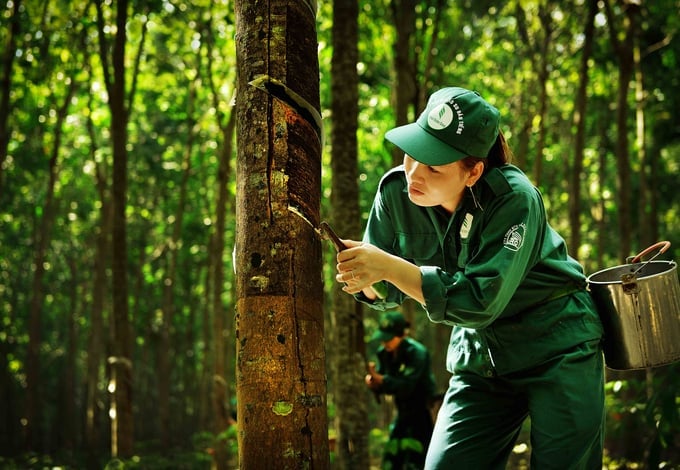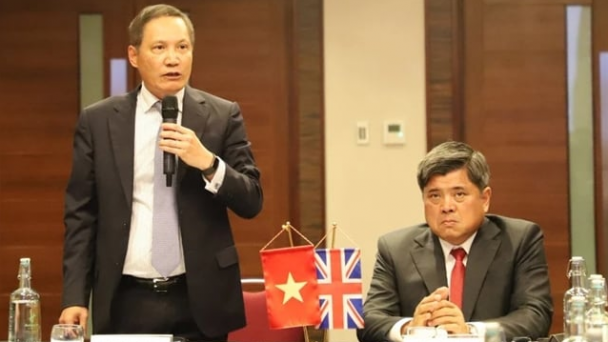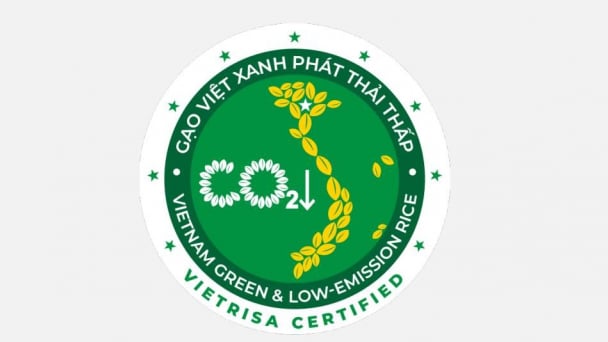May 16, 2025 | 02:18 GMT +7
May 16, 2025 | 02:18 GMT +7
Hotline: 0913.378.918
May 16, 2025 | 02:18 GMT +7
Hotline: 0913.378.918

VRG aims for 60% of its rubber plantation area to achieve national and international sustainable certification by 2030.
Building on the successful sustainable development activities implemented over the past four years, the Vietnam Rubber Group (VRG) has set sustainable development with green growth as a pillar in its Green Growth and Sustainable Development Strategy for the period 2023-2030, with a vision towards 2050.
Accordingly, VRG's subsidiary units are adopting green production and business strategies as their competitive advantage. From environmentally friendly production, investing in production lines that minimize waste and emissions, applying cleaner production solutions, and greening the entire supply chain and production processes, to supporting social activities for community benefits. Additionally, VRG contributes significantly to combating climate change, directly contributing to reducing greenhouse gas emissions towards a carbon-neutral economy in the long term.
As a pioneer in sustainable rubber industry development, VRG has been accelerating digital transformation and developing new technological solutions to promote a stronger and faster green transition. Especially in achieving the net-zero emissions goal by 2050, reducing emissions from agricultural materials through regenerative agriculture is one of VRG's key pursuits.
Continuing its sustainable development journey with significant progress, VRG aims to have 60% of its rubber plantation area certified for sustainable forest management (SFM) by national and international standards (VFSC, PEFC, FSC) by 2030. By 2050, the target is for 100% of the rubber plantation area to achieve SFM certification and 100% of rubber latex, wood, and industrial rubber product manufacturing plants to have product chain of custody certification.
To date, 32 member companies of VRG have developed SFM plans covering 279,303.78 ha. Eighteen members have received SFM certification according to national and international standards (VFCS/PEFC-FM) on 118,336.86 hs of rubber forest. The group has 37 processing plants (including rubber latex, wood, and rubber product processing plants) certified for the PEFC-CoC product chain of custody.
Throughout its operations, VRG remains committed to sustainable development with a "green" strategy as the foundation, linked to three pillars: economic development, community and social responsibility, and environmental protection. Continuous efforts in the environment, economy, and society have helped VRG's subsidiary companies consistently be recognized among the Top 100 Sustainable Businesses in Vietnam (CSI). In 2019, 10 units were recognized in the Top 100, increasing to 14 in 2020, 20 in 2021, 18 in 2022, and 18 in 2023.
VRG currently has 101 subsidiaries and 16 affiliated companies, operating in five main industries: rubber planting, processing, and trading; wood processing; rubber industrial products; infrastructure investment and industrial park business; and high-tech agriculture. The total rubber plantation area of VRG is 407,800 ha, including nearly 293,250 ha in Vietnam, nearly 87,892 ha in Cambodia, and over 26,661 ha in Laos. VRG has 59 rubber latex processing plants with a total design capacity of 636,400 tons per year.
VRG maintains stable employment for over 83,000 workers with an average income of VND 8.24 million per person per month. Among them, over 20,500 are ethnic minority workers, and over 21,500 are Lao and Cambodian workers. VRG consistently ensures and promptly implements labour policies and benefits.
In 2024, VRG aims for total revenue and other income to reach VND 24,999 billion (2.1% higher than in 2023); pre-tax profit of VND 4,104 billion (2.2% higher than in 2023); and after-tax profit of VND 3,437 billion (0.9% higher than in 2023). In the first quarter, the group's estimated revenue is VND 5,003 billion, with an estimated pre-tax profit of VND 997 billion.
According to Mr. Truong Minh Trung, Deputy General Director of VRG, the Group currently has many member companies that are growing rubber in Cambodia and Laos. Because Cambodia and Laos do not have a sustainable forest certificate management system like in Vietnam, VRG has proactively built a traceability system for rubber latex and rubber wood products in the Group's rubber gardens in these two countries.
Each year, VRG’s member companies buy about 100,000 tons of smallholder rubber. VRG has a plan to support smallholder rubber growers in building digital maps according to EUDR requirements on traceability.
As for the rubber area in Vietnam managed by VRG, as of now, about 80% have been granted the VFCS/PEFC-FM certificate of sustainable forest management, thereby helping the Group basically meet EUDR requirements on traceability. VRG is striving to ensure that by 2025, the entire area of Vietnam will achieve this certificate.
Translated by Hoang Duy

(VAN) Veterinary training should focus on quality, not just quantity. Veterinarians also need more options to pursue specialized training.

(VAN) The veterinary industry needs to be viewed objectively and further invested in to properly demonstrate its role and importance in the new context.

(VAN) The number of veterinarians graduating each year is not enough to meet actual needs, hence a difficult problem for the growing livestock industry.

(VAN) The strategic partnership between Cambodia, the Philippines, Vietnam, and CGIAR ensures that innovative solutions effectively address national priorities for food system development.

(VAN) This was affirmed by the UK Minister of State at the Department for Environment, Food and Rural Affairs during a working session with Deputy Minister Tran Thanh Nam on May 13.

(VAN) On May 13, the Ministry of Agriculture and Environment, in coordination with the Embassy of Vietnam in the United Kingdom, organized a seminar titled 'Connecting trade in Vietnam-UK agricultural, forestry, and fishery products'.

(VAN) The launch of the Vietnam green and low-emission rice brand is a positive signal for both businesses and farmers, marking readiness to reach new heights in the global market.